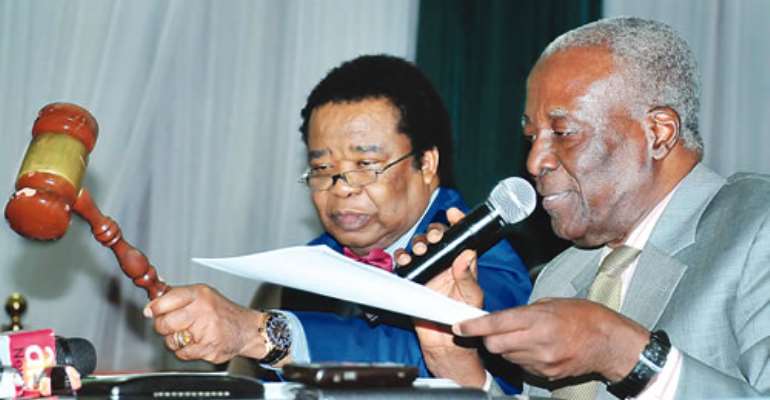Delegates endorse gradual phase-out of pilgrims’ welfare boards

National Conference delegates yesterday adopted a proposal for the gradual phase-out of pilgrims' welfare boards.
Deputy Chairman Prof Bolaji Akinyemi said over 350 delegates endorsed the proposal, following wide consultations.
The conference also adopted a recommendation for the establishment of a Religious Equity Commission (RECOM) with branches in every state.
Delegates could not reach a consensus on the issues last week when the report of the Conference Committee on Religion was considered and adopted.
The issues divided delegates along religious lines: most Christians supported scrapping of the boards; majority of Moslems opposed the proposal.
The division forced the conference leadership to suspend decision on the matter pending further consultations.
Co-Chairman of the Committee on Religion, Alhaji Nurudeen Lemu, took time yesterday to explain why delegates should support the committee's proposal.
Delegates agreed that in place of the pilgrims' welfare boards, the Federal Government should provide normal consular services for pilgrims through the Federal Ministry of Foreign Affairs and Nigerian foreign missions in the relevant destinations.
The conference, last week, adopted the recommendation that the apex religious organizations in Nigeria be allowed to handle all matters relating to pilgrimage through Pilgrims Commissions duly managed by them under a law to be passed by the National Assembly which will regulate their functions and protect pilgrims.
Delegates also accepted that in consonance with Section 10 of the Constitution 1999, government at all levels should not use public funds to sponsor any religious pilgrimage for any category of citizens and government.
The recommendation that government should discontinue the sponsorship of official government delegations on any pilgrimage, in consonance with Section 10 of the 1999 Constitution, was also adopted.
On the establishment of RECOM with branches in every state, the committee proposed and it was accepted that the mandate of the body would include advocacy, enforcement of constitutional religious rights, such as freedom of religion, freedom to acquire land for religious purposes and others within the limits of the Constitution.
Lemu explained that the recommendation of his committee was that the government should no longer sponsor pilgrims, adding that there should be an organisation to handle the welfare of pilgrims.
The delegate said the committee reasoned that there should be government structure to handle the large number of pilgrims, particularly Muslim pilgrims.
He added: 'We acknowledge the emergence of one of the most progressive Emirs in the country; we recognise that we have a very knowledgeable and exposed Secretary-General for the Nigerian Supreme Islamic Affairs (NSCIA).
'We feel that this is the right time to begin the transition where government should no longer sponsor pilgrims. But we strongly believe that there should be a government body to handle the large number of pilgrims, particularly Muslim pilgrims.'
Lemu said the proposal for the creation of RECOM should not be seen as the establishment of more government agencies, especially when the committee also recommended a stop to government sponsorship of pilgrims.
The delegate pleaded with his colleagues to adopt the proposals, adding that the recommendations might not be immune to abuse 'but we strongly believe that this is the best way to go'.
Akinyemi noted that to be assured that delegates agreed with the proposals, the Conference Secretariat asked for evidence.
'I am happy to announce that over 350 delegates endorsed the recommendations,' Akinyemi said.
Before the recommendations were adopted, Hajiya Bilikisu Bello Aliyu, from Zamfara State, moved for the adoption of the proposals; Chief Mike Ahamba, from Imo State, seconded.
The proposals were overwhelmingly adopted by delegates through a voice vote.
